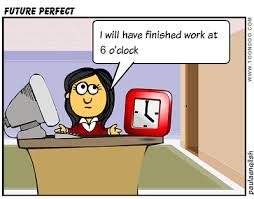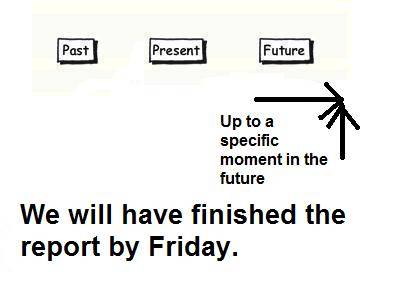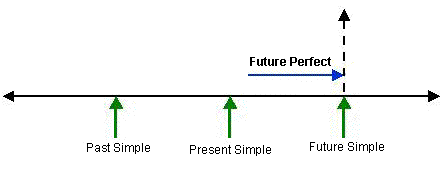Future perfect simple inglese: come si forma e quando si usa esercizi

future perfect come si forma
il future perfect si forma consoggetto +
will have +
past participle .
I will have done = Io avro' fatto
Ricordiamo che il past participle si forma aggiungendo ed per i verbi irregolari e nella terza colonna del paradigma dei verbi irregolari inglesi.
I will have done = io avro' fatto
you'll have done =tu avrai fatto e cosi' via ...
Il future perfect esprime un senso di completezza di una azione che accadra' in futuro :
The ship will have left tomorrow = la nave sara' partita domani
Affermativa
I'll have done
You'll have done
He/she/it will have done
We'll have done
you'll have done
They'll have done
Interrogativa
Will I have done?
Will you have done?
Will he have done?
Will we have done?
Will you have done?
Will they have done?
Negativa
I won't have done
You won't have done
He/she/it won't have done
We won't have done
You won't have done
They won't have done
future perfect quando si usa

 come si vede dallo schema , possiamo pensare al future perfect come al present perfect,
con la differenza che il tuo punto di osservazione non e' il presente ma e' il futuro.
come si vede dallo schema , possiamo pensare al future perfect come al present perfect,
con la differenza che il tuo punto di osservazione non e' il presente ma e' il futuro.
esempi
future perfect con will e going to
Il future perfect tense puo' essere formato ,oltre cha dal future simple con will , anche dal future simple con to be going to , di solito le due forme sono intercambiabili. quindi potremmo anche scrivere :soggetto + am/is/are + going to have + past participle
I am going to have done = I will have done = io avro' fatto
Ovviamente,sia per quanto riguarda will che il going to ,non possono essere usate con le frasi temporali (time clauses) ,ovvero frasi che iniziano con when, while, before, after, by the time, as soon as, if,unless.
Non possiamo dire ad esempio, when I will have done ...
In questi casi si usa il present perfect al posto del future perfect : when I have done .
Un ultimo esempio :
when I will have done my homework , I will go out = sbagliato
when I have done my homework, I will go out = giusto
future continuous e future perfect
il futuro progressivo e il futuro perfetto inglese sono entrambi usati per parlare di eventi nel futuro.future continuous = will + ing form
future perfect = will have + participio passato
- il future continuous
si usa per parlare di qualcosa che sara' in corso ad un ora oppure attorno ad un'ora nel futuro.
this time next monday we will be swimming in the sea
a quest'ora lunedi prossimo staremo nuotando in mare
si puo' usare il future perfect anche se si parla al presente ,per dire delle cose che presumiamo stiano succedendo in questo momento ,ad esempio :
Don't go to the sea now ,it will be raining
non andare al mare adesso ,stara' piovendo
-Future Perfect
il future perfect si usa per dire che qualcosa sara' finito in un particolare tempo nel futuro
In six years I will have retired and I will be able to enjoy my hobbies
in sei anni saro' andato in pensione e sara' in grado di godere i miei hobbies
quando si usa il future perfect e' facile imbattersi in in oppure by
probably sarah will have gone to Australia by 2033
probabilmente Sarah sara' andata in australia entro il 2033
She will have finished her test in tho hours
Lei avra' terminato il suo test in due ore
by significa non piu' tardi di un particolare tempo in significa entro un periodo di tempo non sappiamo esattamente quando qualcosa sara' finito :
I am sure I will have finished the task by next month
sono sicuro che avro' fatto il compito prima del prossimo mese.
non sappiamo quando avro' finito il compito ,forse tra una settimana, forse tra due settimane ,o poco prima che arrivi il prossimo mese
future perfect e future perfect continuous
future perfect = will + have + participio passatofuture perfect continuous = will + have been + ing form
future perfect
nella lingua inglese il future perfect simple e' usato per attivita' che saranno complete prima di un certo tempo nel passato ,spesso insieme ad espressioni di tempo che iniziano con by , by then , by noon , by the end of the century etc . dobbiamo prestare attenzione a non usare il future perfect con espressioni come if , unless , as soon as ,after ,while ,before ,che si usano con altri tempi.I will have sent the mail by saturday
avro' spedito la mail entro sabato
nell'esempio si capisce che al certo tempo del futuro (sabato) l'azione di mandare la mail sara' gia' al passato , per questo si puo' parlare di passato nel futuro.
future perfect continuous tense
questo tempo si usa per attivita' che continueranno nel futuro fino ad un certo punto del futuro ,e non saranno ancora completate . a differenza del future perfect ,in cui l'azione di solito e' al passato ,e' gia' conclusa, nel future perfect continuous l'azione continua in quel tempo specificato nel futuro ,non sara' ancora terminata , sara' ancora in corso.By 2016 I will have been living in Bologna for ten years
entro il 2017 io staro' vivendo a Bologna da dieci anni
(e' sotto inteso che tra dieci anno staro' ancora vivendo a bologna)
differenze tra perfect simple e continuous
il tempo continuo e' usato per azioni incomplete o non interrotte.il tempo semplice e' usato se ci si riferisce ad un numero di eventi singoli o eventi che sono ripetuti
future perfect frasi
John will have done his task by the time the boss comes back
John avra' fatto il suo compito prima che il capo rientrera'
(azione che succedera' prima di un'altra zione del futuro)
The rain will have stopped by tomorrow.
La pioggia sara' finita prima di domani.
(una azione che succedera' prima di un tempo specifico nel futuro)
next year we will have been married for 5 years
il prossimo anno saremo sposati da 5 anni
(uno stato che continua fino ad un certo tempo del futuro)
esercizi future perfect
- future continuous
- future perfect continuous
- future in the past
- esercizi sul futuro in inglese
- grammatica inglese
- futuro con will
- wish
- esercizi di inglese
- past perfect continuous
- past perfect simple e continuous